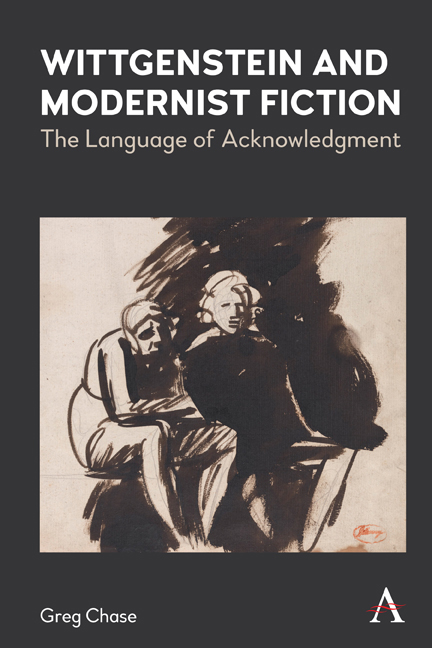Book contents
- Frontmatter
- Contents
- Acknowledgments
- List of Abbreviations
- Introduction: Modernist Philosophy and Modernist Fiction
- 1 “Who’s ‘We’?”: Claims to Community in Forster’s Howards End and Woolf ’s Mrs. Dalloway
- 2 “The Silent Soliloquy of Others”: Wittgenstein’s Pursuit of Acknowledgment
- 3 “To See with the Same Eyes”: Marriage and Same-Sex Intimacy in Ford, Woolf, and Larsen
- 4 Fragmenting Families, Private Language Fantasies: Faulkner’s The Sound and the Fury and As I Lay Dying
- 5 Seeing Humans as Humans: Wright’s Black Boy and Ellison’s Invisible Man
- Conclusion: Afterlives of Acknowledgment
- Notes
- Bibliography
- Index
Conclusion: Afterlives of Acknowledgment
Published online by Cambridge University Press: 27 April 2022
- Frontmatter
- Contents
- Acknowledgments
- List of Abbreviations
- Introduction: Modernist Philosophy and Modernist Fiction
- 1 “Who’s ‘We’?”: Claims to Community in Forster’s Howards End and Woolf ’s Mrs. Dalloway
- 2 “The Silent Soliloquy of Others”: Wittgenstein’s Pursuit of Acknowledgment
- 3 “To See with the Same Eyes”: Marriage and Same-Sex Intimacy in Ford, Woolf, and Larsen
- 4 Fragmenting Families, Private Language Fantasies: Faulkner’s The Sound and the Fury and As I Lay Dying
- 5 Seeing Humans as Humans: Wright’s Black Boy and Ellison’s Invisible Man
- Conclusion: Afterlives of Acknowledgment
- Notes
- Bibliography
- Index
Summary
In the years following Invisible Man's publication, the dominant mode of literary representation would shift from modernism to postmodernism, with alienated, anguished subjects giving way to depthless, decentered ones. As Philip Weinstein notes, the opening of John Barth's novel The End of the Road (1958) emblematizes this latter mode of literary representation: “In a sense, I am Jacob Horner.” The contrast between Ellison's first line—“I am an invisible man”—and Barth’s—“In a sense, I am Jacob Horner”—illustrates the “waning of affect” that Fredric Jameson finds in postmodernist fiction more broadly. The concept of acknowledgment, in Cavell's account, offers a way of accepting and reframing anxieties about the limitations of human knowledge. For this reason, it proves more pertinent to the “epistemological” concerns of modernism than to the “ontological” concerns of postmodernism. The sense of immitigable privacy that motivates other-mind skepticism—a sense that what is inside us cannot be externalized—no longer retains the same relevance in a world of shiny surfaces and affectless subjects.
All this is to say that, the further we move into the twentieth century, the less explanatory power the concept of acknowledgment retains (at least when it comes to dominant trends in literary fiction). From the psychically damaged brothers and sisters whose inner monologues Faulkner articulates, to the alienated Black narrators of Wright's and Ellison's work, to the peripatetic “protagonist” of Wittgenstein's Philosophical Investigations (1953), this book has been concerned with characters, and it has been guided by Toril Moi's observation that “we often respond powerfully to literary characters and often discuss them in terms we also use about real people” (and that we can admit as much without naively equating characters to real people). But works of postmodernist meta-fiction move away from depicting characters who can be discussed using “the same language we use to talk about real human beings.” This shift means that questions of acknowledgment and avoidance, questions of acceding to or resisting other-mind skepticism, grow less urgent, less appropriate.
Even as the literary landscape has shifted, the need for more refined practices of acknowledgment in the world more broadly has remained constant.
- Type
- Chapter
- Information
- Wittgenstein and Modernist FictionThe Language of Acknowledgment, pp. 181 - 184Publisher: Anthem PressPrint publication year: 2022

